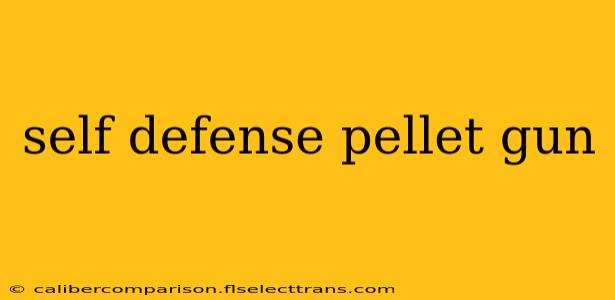Choosing a self-defense tool is a serious decision, demanding careful consideration of legal implications, effectiveness, and personal responsibility. Pellet guns, while less lethal than firearms, offer a potential alternative for self-defense in certain situations. This guide explores the nuances of using pellet guns for self-defense, emphasizing the crucial need for responsible ownership and adherence to local laws.
Understanding Pellet Guns and Their Capabilities
Pellet guns, also known as air guns, use compressed air or gas to propel pellets made of lead, steel, or other materials. Their effectiveness in self-defense is significantly lower than firearms, primarily due to their lower projectile velocity and energy. While they can cause pain and injury, their stopping power is limited. Crucially, the lethality of a pellet gun depends heavily on factors like the pellet type, the gun's power, and the distance to the target.
Types of Pellet Guns:
- Spring-piston air guns: These are generally less expensive and simpler, but require manual cocking before each shot, making them less suitable for rapid self-defense situations.
- Gas-powered air guns (CO2): These offer faster reloading and higher shot rates, but require CO2 cartridges that need replacing.
- Pre-charged pneumatic (PCP) air guns: These offer high power and consistency, but are usually more expensive and require specialized pumps or compressors for filling.
Legal Considerations: The Most Crucial Aspect
The legality of using a pellet gun for self-defense varies drastically depending on your location. Some jurisdictions may consider their use as excessive force, even if used in self-defense. Before considering a pellet gun for self-defense, thoroughly research your local and state laws regarding their use, possession, and the legal ramifications of using one in a self-defense situation. This is absolutely paramount. Ignorance of the law is no excuse.
Effectiveness and Limitations in Self-Defense
Pellet guns should not be considered a primary self-defense weapon. Their limited stopping power means they may not effectively deter or incapacitate an attacker. They are more likely to cause injury than to stop a determined assailant. Moreover, the time it takes to aim and fire a pellet gun might be insufficient in a fast-moving self-defense situation.
Responsible Ownership and Training
Even with their limitations, responsible ownership is vital. This includes:
- Safe storage: Always store your pellet gun securely, unloaded and out of reach of children and unauthorized individuals.
- Proper training: Familiarize yourself with the gun's operation, safety features, and limitations. Consider professional training to improve your shooting skills and understanding of self-defense techniques.
- Understanding limitations: Recognize the inherent limitations of a pellet gun in self-defense situations.
- Knowing when to use it (and when not to): Use only as a last resort and only when your life or the lives of others are in imminent danger.
Alternatives to Consider
While this guide focuses on pellet guns, it's important to note that other self-defense options may be more effective and legally sound. Consider self-defense courses, personal alarms, pepper spray (where legal), or other non-lethal self-defense tools. Consulting with law enforcement or a self-defense expert can provide valuable guidance on appropriate self-defense strategies for your specific circumstances.
Disclaimer:
This information is for educational purposes only and does not constitute legal or professional advice. Always consult with legal professionals and relevant authorities before making decisions regarding self-defense tools and their use. The use of any self-defense tool carries inherent risks, and misuse can have serious legal consequences. Responsible and informed decision-making is crucial.

